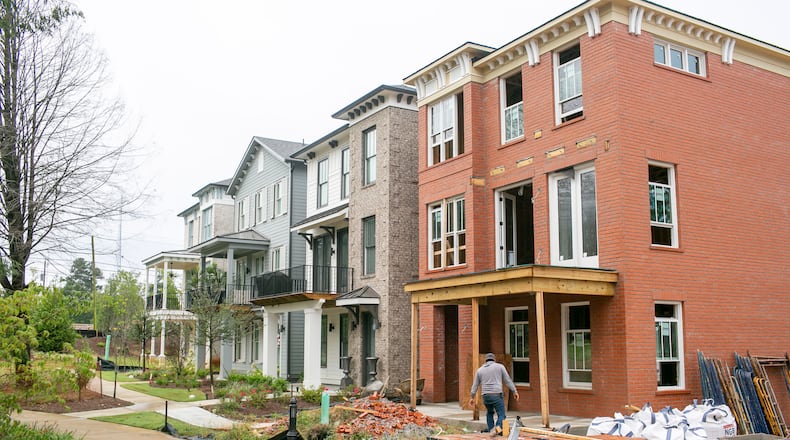Kurt Hunt put big-city crime in the rear-view mirror and traded the congested, noisy highways of Atlanta for the quiet roads of Milton earlier this year.
The 42-year-old Atlanta native is building a home farther north in Fulton County, where he, his wife and two children will have more “breathing space” on three acres as opposed to the half-acre lot at their former Chastain Park home.
The Marist School graduate never thought he’d leave his hometown. But as crime remains a concern and the city surpasses its 100th murder victim this year, Hunt feels he made the right choice to sell his Atlanta home.
Hunt is among a growing number of homeowners who will move to the metro suburbs in coming years. Teleworking freed many workers from their daily drives into Atlanta, giving people the push to plant roots further out.
But as developers have arrived in smaller towns to build more homes, many longtime suburban residents complain the change could ruin their quality of life, bring traffic, crowd schools and cause other problems they hoped to avoid.
The surge in eager homebuyers came as a surprise for some developers who spoke to The Atlanta Journal-Constitution saying they had expected real estate sales to wither after the lockdown ended last year. They quickly responded to the renewed interest by applying for permits to build thousands of new homes around the metro area since 2020.
Dubbed “the great reset” by Stephen Haines, president of Acworth-based Artisan Built Homes, he said after sheltering in place for months, many people realized they didn’t like their home or needed to make a change.
Despite the demand for more housing, the number of housing units permitted for construction in some places during the pandemic dropped in comparison to previous years.
COVID-19 created a “bottleneck” for some developers, said Jim Jacobi, president of Alpharetta-based Parkland Communities. The demand for new homes exists, but it now takes longer for some planning departments to issue permits, he said.
“There’s an opportunity cost involved with that,” Jacobi said. “If it’s going to take me twice as long to do business (somewhere) ... we’re going to try to put in the work in places where we can turn our dollars quicker.”
Suburbia for urban crowds
Sugar Hill, a blossoming city of 25,000 residents in northern Gwinnett, has seen demand soar for apartments to house young professionals and aging adults.
“We’ve been in a housing boom for the better part of, really, 20 years here,” said Sugar Hill Councilmember Taylor Anderson. “It’s been pretty consistent since even through the Great Recession.”
Sugar Hill wrote fewer permits for standalone and attached homes in 2020, but city officials have greenlighted permits for hundreds of luxury and senior apartments over the last few years.
Suburban cities with walkable downtown areas attract residents, Anderson said, giving them dining and entertainment options without leaving their tight-knit communities. He said he’s significantly more likely to run into someone he knows at a concert in The Bowl at Sugar Hill than a concert at the Fox Theatre.
Credit: The Praedium Group
Credit: The Praedium Group
A decade ago, people felt like they had to live near entertainment hubs like Buckhead, Midtown or Vinings to have fun places to go out and shop, said Clif Poston, a principal at Marietta-based Traton Homes. The downtown environments created in cities like Duluth, Marietta and Suwanee have convinced younger crowds to live outside the city, he said.
But some people worry that as their small communities continue to grow, they’ll lose their character. Amber Chambers, a Sugar Hill resident, worries that the luxury apartments cater to transients who don’t intend to put roots down in their communities.
Chambers, who grew up near north Gwinnett, relocated to the area five years ago for Sugar Hill’s status as a bedroom community and its access to the outdoors. As Sugar Hill and other suburban cities start to change, she believes longtime residents will start moving away.
“I knew where urban areas were; I could find them on a map,” said Chambers, who unsuccessfully ran for City Council in 2019 and will run again this year. “If I wanted to live in one, I would be there.”
Not all communities with growing pains are in far-flung small towns. Communities inside the Perimeter have also experienced interest from developers.
New mixed-use developments with office, retail and apartment space are coming to Chamblee, a city in DeKalb County once known as an industrial area, said Economic Development Director Laura Linman.
“Now intermixing (of development types) is preferred, where people can walk to restaurants and parks,” Jacobi said. “Walkability is a big attraction to a lot of communities.”
Credit: Rebecca Wright
Credit: Rebecca Wright
Chamblee’s population grew by more than 200% from 2010 to 2020 and is weighing a recent application for a development with over 700 townhomes, apartments and single family houses.
The demand to move to Chamblee stems from a few factors, Linman said, including its MARTA station, relative affordability compared to other suburban cities and the international cuisine of Buford Highway.
Susan Cannon, planning director for Gwinnett County, said the county’s diversity, proximity to Atlanta and major highways like I-85 play a role in its housing demand. “We have great parks, great schools and great public safety services, she said. “It’s just a great location to live.”
Gwinnett’s planning department approved fewer single-family houses and townhouses in 2020 compared to previous years. But only halfway through 2021, the second most populous county in Georgia is on pace to surpass the numbers seen in 2018 and 2019.
New neighbors
Auburn, a small city on the edge of Barrow and Gwinnett counties with fewer than 8,000 residents, expects to add 1,000-1,200 new homes over the next few years to house new residents. Current residents packed into City Council chambers a few months ago to offer differing opinions on two new developments.
A group of southeast Gwinnett homeowners distributed a petition, printed yard signs and showed up wearing red at a Board of Commissioners meeting during the early months of 2021. The residents opposed a plan to place apartments and townhomes in unincorporated Loganville. In the face of their complaints about the potential loss of the area’s rural character, developers withdrew the plan.
Haines said that most cities generally dislike dense development. “This is a very generic statement, but it’s true almost anywhere you can pin a dart on the map: These counties and municipalities are fighting density.”
However, the outright aversion to density is slowly shifting in some places, said Chris Poston, who also serves as principal at Traton Homes with his brother, Clif.
Developers and elected officials hold that cities must grow and offer a variety of housing options to thrive. Denser, smaller homes are necessary, Haines said, because “not everybody’s wealthy.”
“There are different housing types at different points in our lives,” Anderson said. “For us to be a community where you can live your entire life in the same community, a diversity of housing choices is needed.”
Famous for its many horse farms, Milton also saw a lull in the number of homes approved for construction in 2020, though the numbers have bounced back so far in 2021. Demand to move to Milton certainly exists, but the city treads cautiously in dishing out new permits, said Bob Buscemi, Milton’s community development director.
Officials prioritize “smart-growth principles” to maintain the “pastoral, rural feel and look” that drew many of its residents to move there, Buscemi said.
That feeling drew Hunt to relocate to Milton, who hopes to finish his home later this year. The investment manager drives into Buckhead for his favorite sushi restaurant, but nearby Avalon and Crabapple keeps his family busy.
“It’s a beautiful part of Georgia with country roads, big open fields (and) pretty woods,” Hunt said.
About the Author
Keep Reading
The Latest
Featured






